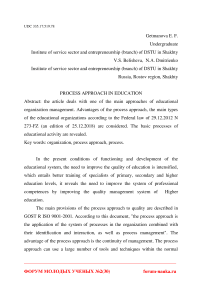Process approach in education
Автор: Getmanova E.F., Belisheva V.S., Dmitrienko N.A.
Журнал: Форум молодых ученых @forum-nauka
Статья в выпуске: 2 (30), 2019 года.
Бесплатный доступ
The article deals with one of the main approaches of educational organization management. Advantages of the process approach, the main types of the educational organizations according to the Federal law of 29.12.2012 N 273-FZ (an edition of 25.12.2018) are considered. The basic processes of educational activity are revealed.
Organization, process approach, process
Короткий адрес: https://sciup.org/140285711
IDR: 140285711
Текст научной статьи Process approach in education
In the present conditions of functioning and development of the educational system, the need to improve the quality of education is intensified, which entails better training of specialists of primary, secondary and higher education levels, it reveals the need to improve the system of professional competences by improving the quality management system of Higher education.
The main provisions of the process approach to quality are described in GOST R ISO 9001-2001. According to this document, "the process approach is the application of the system of processes in the organization combined with their identification and interaction, as well as process management". The advantage of the process approach is the continuity of management. The process approach can use a large number of tools and techniques within the normal structure of education. One of the tools of intelligent management is the so-called "process approach". Process approach- is an approach to the organization and analysis of the company, based on the allocation and consideration of its business processes, each of which takes place in conjunction with other business processes of the company or the external environment. Let’s consider the process approach on the example of an educational organization.
According to the Federal law of 29.12.2012 N 273-FZ (edition of 25.12.2018) "about education in the Russian Federation", the educational organizations are subdivided.
Article 23. Types of educational institutions
-
1. Educational organizations are divided into types in accordance with educational programs, the implementation of which is the main purpose of their activities.
-
2. In the Russian Federation, there are the following types of educational organizations that implement basic educational programs:
-
1) pre-school educational organization
-
2) General education organization
-
3) professional educational organization
-
4) educational organization of higher education. [1]
Educational institutions have the right to form educational associations (associations and unions), including the participation of institutions, enterprises and public organizations (associations). These educational associations are established in order to develop and improve education and operate in accordance with their statutes. The procedure for registration and activities of these educational associations is regulated by law.[3]
The rights and obligations of educational institutions provided for by the legislation of the Russian Federation apply to public organizations (associations), the main statutory purpose of which is educational activities, only in terms of the implementation of their educational programs. In an educational organization, the main processes are those that determine the main activity of the educational institution aimed at the qualitative satisfaction of the customer's order. These include:
-
- marketing and advertising;
-
- admission of students;
-
- development of educational programs;
-
- implementation of educational programs;
-
- development of additional education;
-
- implementation of additional education;
-
- educational process;
-
- scientific and innovative activity.
Each of these items is closely connected with each other, so you can not miss any of them. Education keeps pace with the times, with modern and innovative technologies, which makes it easier to train students and achieve great results in all areas.
The main provisions of the process approach to quality are described in GOST R ISO 9001-2001. According to this document, "the process approach is the application of processes in the organization combined with their identification and interaction.[2]
The main characteristic of the methodology of business processes is the focus on their improvement. This statement goes well with the concept of the development of education with constantly changing technologies. Processes are threads of work, and they have their limits, that is, in other words, the beginning and the end. For a single process, the boundaries are set by the initial inputs from which it begins. These inputs are opened by the primary process providers. The process ends with an output that outputs the result to the primary process providers.[4]
In the construction of any process, it is very important to monitor its implementation in order to identify the effectiveness of this process in comparison with others.
The introduction of this method in the management of the education process will significantly improve its quality, which is an important factor in our time, when Russia in many areas of activity comes to international standards, including in education.
List of sources used
-
• 1. The Federal law of 29.12.2012 N 273-FZ (edition of 25.12.2018) "about education in the Russian Federation".
-
• 2. ISO 9000: 2000 quality management Systems. Basic provisions and dictionary.
-
• 3. ISO 9001: 2000 quality management System. Requirements.
-
• 4. Conti, Tito. Self-assessment in organizations: Per. with English. -- M.: RIA "Standards and quality".
Список литературы Process approach in education
- The Federal law of 29.12.2012 N 273-FZ (edition of 25.12.2018) "about education in the Russian Federation".
- ISO 9000: 2000 quality management Systems. Basic provisions and dictionary.
- ISO 9001: 2000 quality management System. Requirements.
- Conti, Tito. Self-assessment in organizations: Per. with English. - M.: RIA "Standards and quality".


